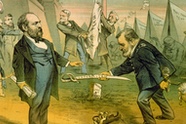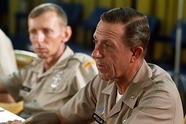Historians/History 
-
6/25/2023
The Unlikely Success of James Garfield in an Age of Division
by C.W. Goodyear
In a bitterly divided and restive political climate, James Garfield was too old, too esconced in the Washington establishment, and too conciliatory to be a credible candidate or a successful President. But he did ultimately change politics, though he didn't live to see it.
-
6/25/2023
Martha Hodes Talks "My Hijacking" with HNN
by Michan Connor
In 1970, when she was 12, Martha Hodes was held hostage for nearly a week in a campaign of airline hijacking that captured world attention. She discusses trauma and erasure in the historical record, the roles of remembering and forgetting in shaping views of the past, and how she investigated herself as a historial actor.
-
6/18/2023
Jared McBride Sheds Light on the Darker Parts of Ukraine's History
by James Thornton Harris
The issue of Ukrainian collaboration with Nazi genocide has been a propaganda point in the war with Russia. Historian Jared McBride talks about the complexities of ethnic violence and the complications of archival research in Russia and eastern Europe.
-
6/18/2023
Maps are the Record of Humans' Imagination of the World
by Meredith F. Small
World maps have always been made without regard for practicality. Useless for navigation or for demarcating ownership, they are imaginative and expressive of a society's view of the world—which makes them important.
-
6/4/2023
Recovering the Story of the Empress Messalina After a Roman Cancellation
by Honor Cargill-Martin
After the empress Valeria Messalina's fatal fall from favor with her husband Claudius, her name and image were stricken from public and private spheres, an episode that reveals the tightly-regulated dissemination of imperial women's images (and puts current "cancel culture" panic and whisper networks into perspective).
-
5/31/2023
Ayn Rand's Defense of an Anti-Union Massacre
by Greg Mitchell
The screenwriter and novelist was inspired by the 1943 memoir of Republic Steel head Tom Girdler, in particular his refusal to apologize for collaborating with Chicago Police to crush a march of striking steelworkers and their families in 1937.
-
5/28/2023
What We Can Learn From—and Through—Historical Fiction
by Carol K. Kammen
"I have written this to praise historical fiction when it respects the line between our times and the past, when it adheres to the known-truth and does not pervert it for excitement—or for book sales."
-
5/21/2023
From "Shell Shock" to PTSD, Veterans Have a Long Walk to Health
by Charles Glass
Iraq War veteran Will Robinson brought himself out of a mental health crisis by hiking more than 11,000 miles of trail from the Pacific Crest to the Appalachian, following the century-old prescription of British military doctor Arthur Brock.
-
5/14/2023
Mary Wollstonecraft's Diagnosis of the Prejudices Holding Back Girls' Education Remains Relevant Today
by Victoria Bateman
Since Wollstonecraft's 1792 condemnation of the strictures of modesty and sexual purity as unjust impediments to the education of girls and women, they remain principal justifications for keeping girls out of school.
-
4/30/2023
Travel Was a Driver of Eleanor Roosevelt's Leadership
by Shannon McKenna Schmidt
Eleanor Roosevelt's leadership on behalf of the New Deal and the national war effort were always enhanced by her enthusiasm for travel, which culminated in a 25,000 mile journey to the Pacific theater in August, 1943.
-
4/30/2023
Can We Learn from Previous Generations of Historians Negotiating Between Past and Present?
by Bruce W. Dearstyne
A leading historian shook up the field with his insistence that historians engage with public concerns and research topics that shed light on the most pressing issues of contemporary society. The year was 1911.
-
4/30/2023
Recognizing the "Other Renaissance" of Northern Europe
by Paul Strathern
From Copernicus to Shakespeare, the intellectual transformations of northern Europe have seldom been understood as a world-changing ferment akin to those taking place in Italy.
-
4/30/2023
For Derby Day, a Note of Caution About Horses and "Races"
by Mackenzie Cooley
The thoroughbreds on display at Churchill Downs next Saturday carry on Italian renaissance practices of horse breeding for sport and aesthetic pleasure. But the spectacle warns of another legacy: the fateful transfer of the term "race" from purposefully selected lineages of horses to broad groupings of humans.
-
4/23/2023
"Class War" is Back in the Headlines. But What is it, Really?
by Mark Steven
"The proclamation of class war is what linguists might describe as a speech act: a performative utterance that, when said, is also a kind of action," invoked in the hope of moving from class struggle to open conflict.
-
4/9/2023
When Truly Stolen Elections Changed the Course of American History
by Stan Haynes
A massive conspiracy to bring in outside voters successfully stole an election everyone thought was vital to the fate of the country. It wasn't your state in 2020, but the Kansas Territory in 1854 and 1855.
-
4/9/2023
Why Did Madison Write the Second Amendment?
by Carl T. Bogus
Understanding the political peril that ensnared both the pre-ratification Constitution and James Madison himself makes it clear that the Second Amendment was written to ensure that southern state militias would be sufficiently armed to suppress slave revolts even if abolitionists controlled Washington.
-
4/2/2023
50 Years Later: Eyewitness to the Last Day of US Military Command in Vietnam
by Arnold Isaacs
In this excerpt, a journalist observes the tragicomic exit of the last US military command in Vietnam 50 years ago on March 29, 1973.
-
4/2/2023
Learning from Historical Fiction: A Family Tale Reveals a Brief Multicultural Moment of the American West
by Alix Christie
One novelist's work adapting the story of her 19th century forebears (the last Hudson's Bay Company trader in the US, his Nez Perce wife, and the family that they raised) led her to archives, historians, and the challenge of narrating the complexities of the period when conquest supplanted a hybrid indigenous-European society between the Rockies and the Pacific.
-
3/19/2023
The Curious History of Ulysses Grant's Great Grandfather
by John Reeves
The military experiences of Noah Grant in the French and Indian War typified changes in military strategy in the Americas and cemented a family commitment to the military that drove his great grandson Ulysses.
-
3/12/2023
How The Irish Saved Wellington at Waterloo
by Brendan Farrell
For centuries, the Irish provided manpower to the British military, never more notably than on June 18, 1815.
News
- Josh Hawley Earns F in Early American History
- Does Germany's Holocaust Education Give Cover to Nativism?
- "Car Brain" Has Long Normalized Carnage on the Roads
- Hawley's Use of Fake Patrick Henry Quote a Revealing Error
- Health Researchers Show Segregation 100 Years Ago Harmed Black Health, and Effects Continue Today
- Nelson Lichtenstein on a Half Century of Labor History
- Can America Handle a 250th Anniversary?
- New Research Shows British Industrialization Drew Ironworking Methods from Colonized and Enslaved Jamaicans
- The American Revolution Remains a Hotly Contested Symbolic Field
- Untangling Fact and Fiction in the Story of a Nazi-Era Brothel























